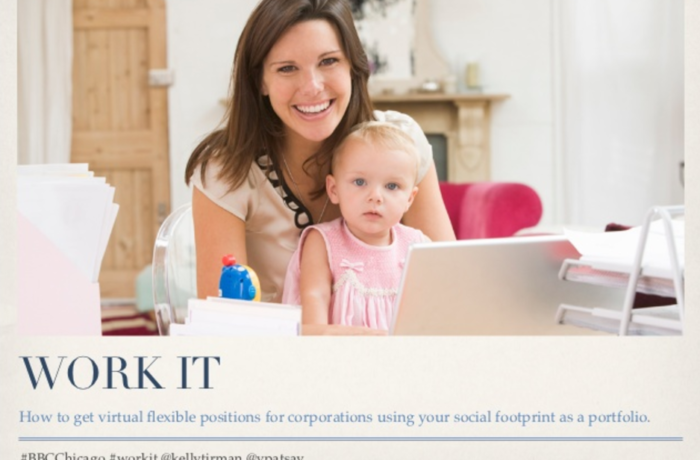WHO SHE IS: Andrea K. Garry, PhD., Human Capital Senior Consultant at Deloitte Consulting LLP
LOCATION: Los Angeles
SUCCESS STORY: I achieved the best of two worlds: I have an exciting career in the fast-paced and challenging field of business consulting AND I am a mom who is fully present and engaged in my daughter’s life.
WORK SCHEDULE: M-W, 30 hours per week
KIDS: Olivia, 3
SANITY VICE: “WriteItDown” – I live by my to-do lists. As soon as I write it down I don’t have to think about it anymore – at least for the moment – and it frees up my mind for more pressing things at hand. My lists really help me stay sane and organized – plus I love crossing things off the list once completed.
BEST TIMEMANAGEMENT TIP: Pre-cook meals for the week over the weekend
GO-TO TECH: FaceTime and Skype so Olivia can regularly see and play with her grandparents in Germany and across the United States
WORKLIFE BALANCE? (1 – 10): I would say I am at a happy 7
5 Questions for Andrea
1. You’ve been with Deloitte for six years and had a little girl along the way. When you became a mother, you knew the 55-hour consulting work weeks had to go, and negotiated a reduced workload. How did you do this?
When I first started my career at Deloitte, someone said to me that here you “own your career” – you need to determine your path within the firm, you need to ask for what you want, and most importantly, you need to set the limits. No one else will do that for you. Once I became a mom, this advice took on a whole new meaning!
Applying this advice to my new situation, I did three things that helped me to successfully negotiate a reduced workload and were critical in making my new schedule a reality:
- The first and most important step was to become very clear about what I needed, what my family needed, what I was willing to give, what my boundaries and priorities were and ultimately, what I needed from Deloitte to make this work.
- The second step was to build a business case for myself that not only highlighted my value to the firm but also clearly showed that I had put a lot of thought into how I envisioned making a reduced schedule work – not just for myself but also for the firm, my clients, and my team members.
- The third step was to be transparent and to clearly communicate my priorities, boundaries, value and plan to Deloitte leadership – BUT in a way that demonstrated I had considered the firm’s needs as well.
2. What kind of transition did you and the company go through to get you down to three days a week, and how has it affected your career?
Probably the biggest personal transition I went through was to truly re-prioritize my life and shift from being 100% focused on my career to being a mom first. Being my ambitious self, I was at first concerned that going part time would slow down my career and limit the type of work I could do in the firm. But I can honestly say that neither has been the case!
I still progress in my career, but – and that is the big difference – at my own pace, which is a very empowering feeling! It has been my own choice to scale back a bit and progress at a slightly slower pace for now because my daughter and family are my priority.
Nowadays, I navigate my career more strategically to ensure that I have good work-life balance and enough flexibility to be a happy mom. So for example, when it comes to internal firm activities, I am much more selective around where I spend my energy and only get involved in a few high-impact activities that I am truly passionate about.
I have also learned to say “no” without offending others. While at first it was difficult to say no, I have come to realize that most people appreciate an honest “no” rather than someone just saying yes and then not being able to pull their weight down the line. Having said all this, there are always exceptions and, if necessary, I will make myself available during my off days in an emergency and I am fine with that. But – I make it very clear that that should be treated as an exception rather than the rule – and everyone has been fantastic in respecting that.
3. One of the challenges of a reduced workload is the accessibility we all have with our smartphones. How have you managed this on the days you are with your daughter?
I try to turn my “work brain” off when I am at home with my daughter. To that end, I am strict with myself to not check work emails when she is awake and keep my phone on mute. I also have my “out of office” email reply on and my Outlook calendar blocked, so others will see and get notified that I am not available. This helps me feel less concerned about not answering an email or phone call right away.
However, during my off days, I do set aside about 30 to 60 min in the morning before Olivia gets up and take time during her nap time to check emails or take care of a few work related things that need my immediate attention. I will be honest, it is not always easy to distance myself from work during my off days, but I really try.
4. How has Deloitte’s culture been a key to making this a successful opportunity for you?
What I appreciate about Deloitte is that they understand that there is no “one size fits all, climb up the corporate ladder” model – especially not for parents. Instead, Deloitte lets people move along their individual career paths that account for the fact that careers ebb and flow and that priorities change over time.
However, I think it is important to point out that finding and incorporating more flexible options into one’s work schedule is more of an earned privilege over time rather than an immediate employee right. I don’t actually think that there are a lot of flexibility options for people when they first walk in the door. Rather the expectation is that you first need to work hard, prove yourself and build your support network, because without the right leadership support, maintaining a reduced work schedule seems impossible.
5. I’m asking everyone how they “work smart” as a means to foster their own work & family flexibility. Are you doing anything new or interesting along these lines?
I don’t think I am doing anything new or innovative here but these are the few things that help me maximize my time:
- I get up early in the morning and try to do lot of work even before my daughter gets up
- I generally schedule most of my conference calls during my commute to use my time in the car wisely
- I try to plan my week ahead as best as possible and block time on my calendar to be able to focus on work that needs my undivided attention
- I have learned to delegate more – I used to have the tendency to want to do it all myself – now I realize that is just not necessary or even possible
5+. What’s the media missing about working moms, in your opinion?
I think the media needs to emphasize how amazingly efficient working moms are and that we can get the job done in the most effective manner since we just simply do not have any time to waste!
Also, the media needs to emphasize how much of a win-win situation it is if an employer offers more flexibility for working moms. Based on my own experience I can say that working moms are grateful when an organization recognizes their talents and makes a genuine effort to retain them by giving them more flexibility to have a successful career and a meaningful family life. I truly believe that providing working moms with more flexibility can translate directly into more hard work, loyalty and passion for the work we do!
Read more about Deloitte’s work-life fit options in our Spotlight on Flexibility: Deloitte.
Maybrooks is a career resource for moms. Search jobs, research family friendly companies, and find tools to navigate your career. Stay in touch with our newsletter. Employers can post jobs and create profiles to get in front of women talent.
Sign up for our newsletter:
Oops! We could not locate your form.
———-





